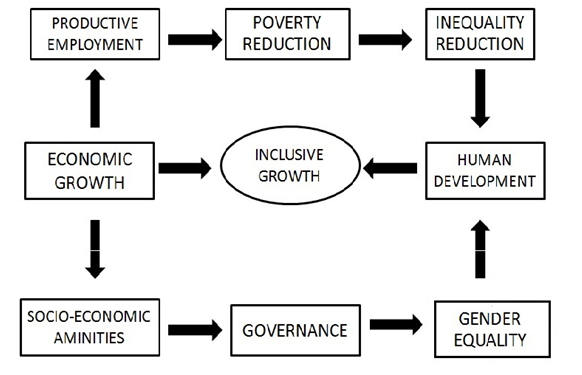In the aftermath of the global economic crisis, the Indian economy was able to make an average growth of 6.7% while the global average was 2.7% during 2010-16. But this growth was not complemented with job creation which crawled at just 2% a year in the formal sector. Around 80% Indians are employed in the informal sector which is plagued by several structural challenges and are largely deprived of the benefits of growing GDP. The solution of unemployment lies in making growth inclusive.
THE VICIOUS TRAP
India is the epitome of unity in diversity. This feature is very unique to India and finds its manifestation in various socio-economic domains. The problem of unemployment is not purely economic in nature; rather it is deeply rooted in socio-cultural realities. Similarly, the notion of inclusive growth too encompasses of several dimensions including class-caste identity, resource ownership, and political significance among others.
Interestingly unemployment and lack of inclusive growth reinforce each other. An individual for the lack of inclusive growth remain deprived of the various institutional services offered by the State and ends up being ill-trained to be a part of the formal work force. This combined with State’s failure to provision adequate job opportunities results in unemployment.
BREAKING THE TRAP: Striking The Right Cord
India has a huge population. Every year more than 12 million people enter India’s workforce. This poses an opportunity as well as a challenge for the policy makers. In the latest report World Economic Forum, India has been placed at a low 103 rank on Global Human Capital Index.
80% of the Indian labour force is in the informal sector. A comprehensive policy approach complemented with efficient ground implementation is the way out. The vicious trap cited above can be engineered primarily by laying emphasis on skilling the workforce and creating job opportunities along with encouraging entrepreneurship.
These efforts should be circumvented by effective implementation of ongoing policies relating to financial inclusion, social upliftment among others. It is high time that time bound outcome based policy measures be taken to boost inclusive growth leading to the creation of employment opportunities else the country runs the threat of demographic dividend being turned to demographic disaster.









Pingback: Why India Can Become Third Largest Economy of the World by 2028?